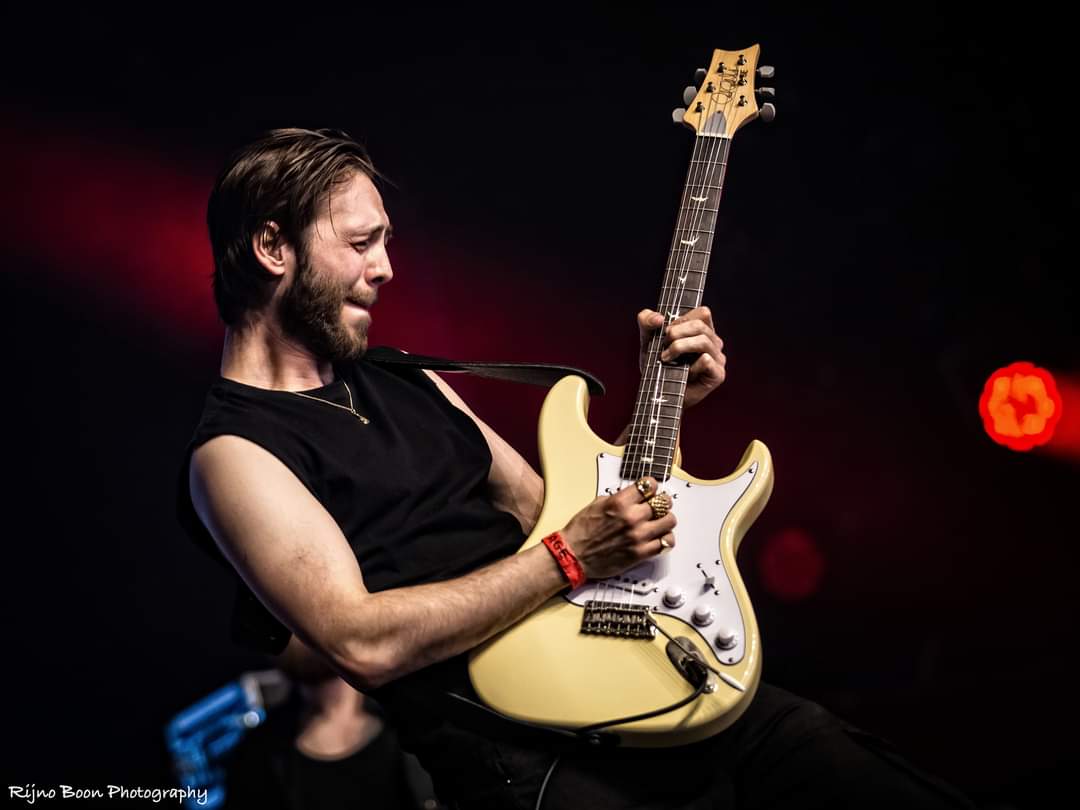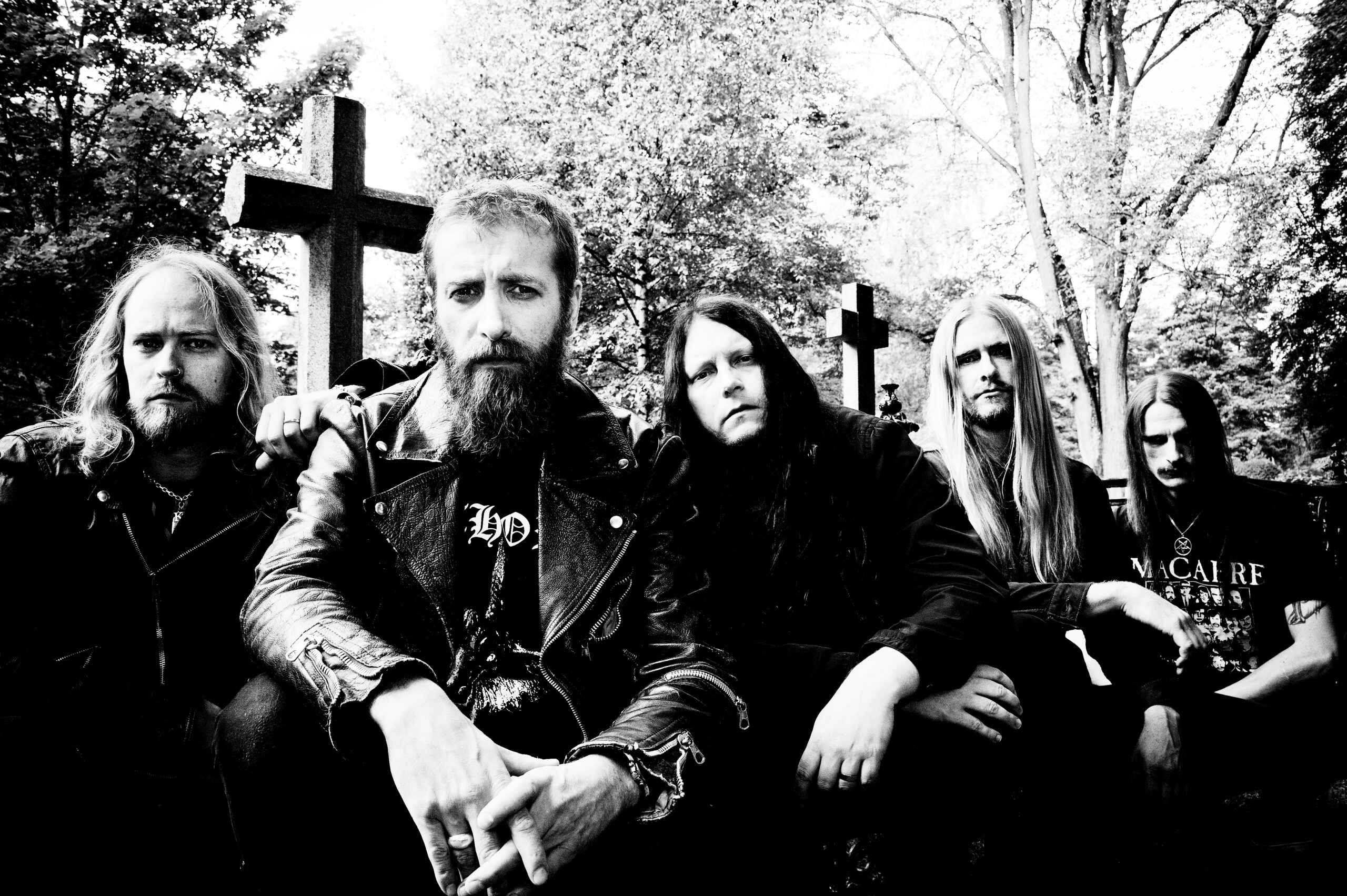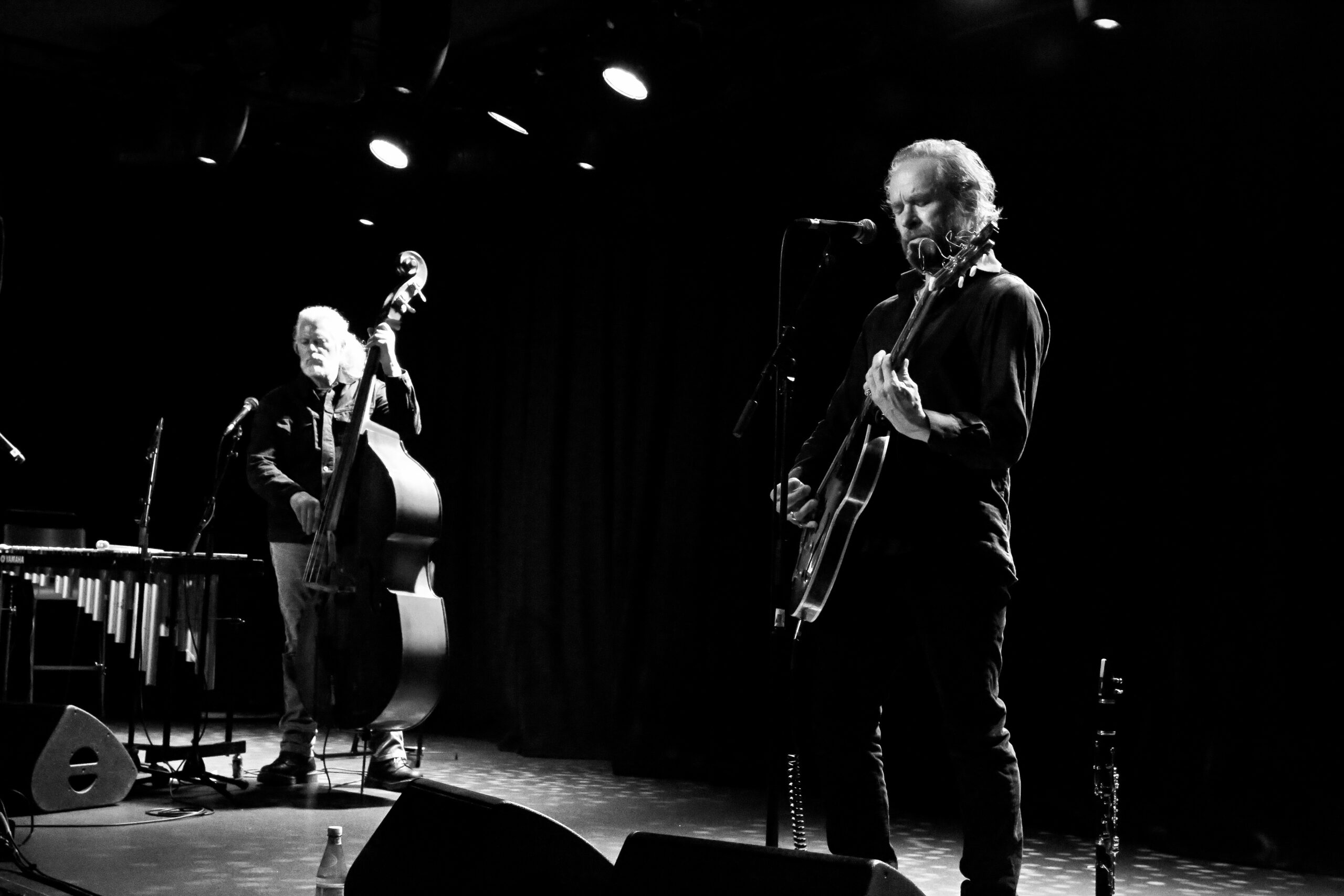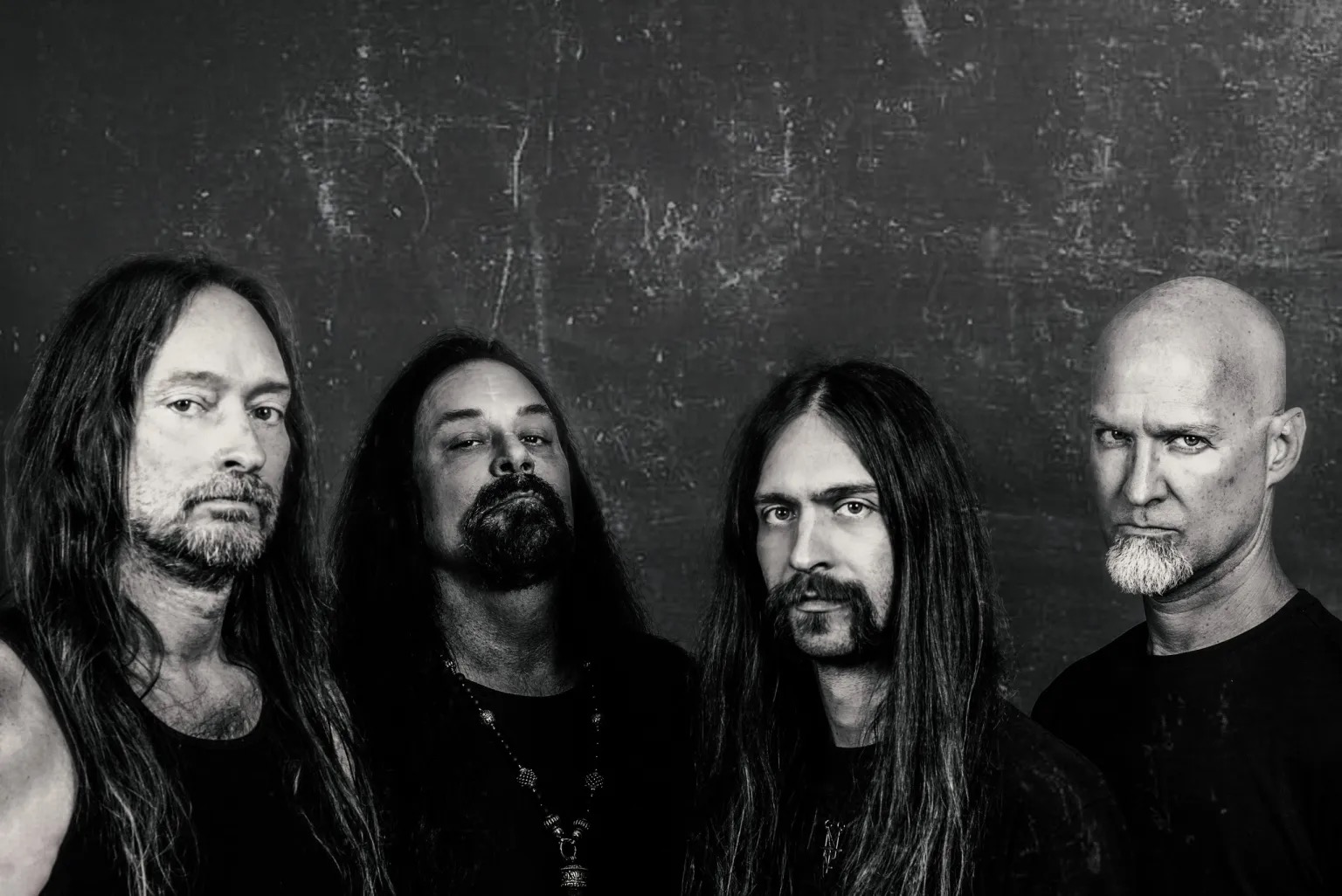With the pandemic still limiting indoor meeting, a random Monday evening finds me sat in a beer garden in the Leicestershire countryside, rain pouring from the sides of the canape under which I am nestled and threatening to turn an otherwise tasty ale into rainwater shandy. I’m crouched here, away from the main group, because I’m set to interview the legendary Michael Stutzer of Artillery. Perhaps fortunately, given the noise the unseasonable downpour produces, Michael is delayed and so, a pint or so later (and with the rain, thankfully, abated), I find myself back under my makeshift shelter, ready to discuss the fantastic X, the latest album from Artillery and a powerful tribute to Morten Stutzer, who so tragically passed away shortly after the Face Your Fear album.

I like your profile picture, whenever I see people standing in front of a wall of CDs, I instinctively want to go through and see what’s in there!
I love music, you know, it’s the main reason why I’m playing music. I have about four or five thousand CDs and about twelve hundred vinyl records. I grew up in the seventies with all those kind of things like Black Sabbath up to, of course Slayer. I have a lot of stuff and no pop music! No rap music. Only heavy and hard rock.
I grew up in the eighties and, for me, it’s the same. I love the art of making an album and the artwork that goes into it and the attention to detail. It’s something very special, I think.
Yeah, it’s the main reason for people to like music, I think. If you only go for one MP3 for one band, to one song. It’s very boring, I think. You need to have a full album to see all the details and, while you listen, you can look at that and that’s the best thing, I think.
I totally agree and I love the fact that, on the new record, you went for that kind of mentality – that side A / side B kind of flow, where it comes to a climax at the mid-point, and then the second side follows a similar pattern, and the whole thing plays out like a journey for the listener.
Yeah, that’s true. And hopefully… you can see many young people are going to buy vinyl again, and some people are even starting to buy CDs again, so it’s great! We can cross our fingers that the whole thing will go that way again.
Some people are even buying cassettes again – I never thought I’d see cassettes return to the market, but it’s a kind of cool nostalgia thing.
I still have some cassette tapes and some old videos, you know. I still have them and, you know, I have them in my collection. But of course, I don’t hear cassettes anymore, but I still keep hold of them, just to have them. It’s cool to have them.
I’ve always been a huge fan of creating the album, as I said, like a journey and I think one of the hardest things to do as a band is to sequence the album in the way that it flows coherently. Is that something you’ve found?
Yeah, I think so. It’s always cool to have it, like you said… you listen to that whole album. If you only hear one song… for example, if I only heard one song from Slayer it would be great, of course, but you really have to hear the whole album to really see if it’s something you like or not. If you don’t hear the whole album, you’re missing something.
Yeah, exactly! And that’s one of the things about finding a band that you love – it’s going in and finding those songs that don’t get played live and which aren’t singles – that’s the exciting part of being a fan, I think.
Yeah, that’s true. And I’m both a fan and also a musician – it’s a good combination.
You’ve said in a number of interviews that, on this record, it’s the best production you’ve ever had and that’s really cool – it’s a really dynamic record and that’s something that can get lost – how important it is for metal to be heavy, but have those quiet passages…
Yeah, a metal album needs to be like a live set. I think the production on this album is so good because Soren [Anderson] is also a musician himself and he puts as much dynamic into it as he can, and that’s what I really like about his productions. Since he started, he’s just been getting better and better and better, and he’s really nailed it on this album – I’m so glad for the production here.
And it’s a really good balance too, because it’s powerful and dynamic, but it’s not so clean and crisp that it’s lost its soul if you know what I mean?
Yeah, I know of course. Many albums today have some good songs, but they sound very sterile. They’re not dynamic, as you said, they’re very sterile. It’s like, you never really come into the music because, when you hear it, it’s almost pushing you away because it sounds so clean.
And I think, particularly for music like Artillery, because for me, on the one hand, you’ve got that heavy, dark thrash edge… but then you’ve also got that classic rock edge that recalls Deep Purple, so you’ve got those great, clean melodic vocals and you want to have that soul…
Yeah, and I think that today so many thrash bands are very good, but many of them really sound very similar to each other, because they go for the same producer. We really try to keep those moments from seventies and eighties bands like, as you said, the vocal and the catchiness in the songs. So, we really try to keep that, and I think some people really like that. And some people don’t like it, but that’s the way we try to play the music we want to hear ourselves and that’s the reason, I think, that Artillery have been going for such a long time – because we love what we’re doing.
I think that’s so important. The music industry is very changeable, but as long as you love what you are doing, it really doesn’t matter what else happens around you.
Yeah, that’s true. For example, we never got as big as those bands like Exodus or Destruction or those kinds of bands. We have to really like what we’re doing, because we’re touring all the time and we have to keep going and we have to show ourselves even more, and we love to do that. But I think the new album has opened some new doors again. We’ve been on the German album charts! We’ve never done that before, so that’s really cool. So, that’s funny, but it’s really cool.
That’s awesome, and it’s deserved. The vocals on this record… for me, they’re a career best. He’s got such power in his voice…
Yeah, I’ve always said that Michael is a very good singer and he’s also a very good friend, you know. We have a very good friendship in Artillery and, these days, we love to hang out and drink some beers and go have fun. I think the way Michael sings in the kind of music we write is very different from many bands in that kind of genre. And, as I said, we love to hear that. Some people say “ah, if you had a death metal singer, it would be great”. But we never had that kind of thing. We always had singers who were clean and, of course, there’s a difference in the way they sing. But we never had a guy like that, growling or anything like that, and we never wanted to. As I said, we grew up in the seventies, where thew singer should sing – and really sing, you know. And I’m not against growling – there are some bands who do it really well – but in Artillery, it wouldn’t fit.
And then, right at the heart of the album, you have this amazing song – The Ghost of Me – that’s almost progressive in its scope. It’s an amazing piece of music to put at the heart of the album.
Thank you very much. Yes, and that’s also because Michael can sing that kind of stuff… and I personally really love to play the solo in that song, because it’s not so often you can get that kind of thing when you play fast. So, I really love it when albums have a ballad kind of song, or a progressive kind of song, because that’s… for example, if you take Master of Puppets, it’s one of my favourite albums of all time and that’s because the variations in the songs keep it strong, you know.
Because, if you have to have ten songs that really are fast all the time, or ten ballads that are really slow, there’s no variation. But the variation in the songs here is really good because The Devil’s Symphony and In Thrash We Trust are really fast songs, and then The Ghost of Me is a really ballad type song, or Varg I Veum is a more mid-tempo song, and that’s really what I like. Turn Up the Rage really opened some new doors for us because it has that kind of old, Thin Lizzy kind of stuff in it. So, it’s cool to get the variation in the songs.
Yeah, and that comes back to what was saying about the importance of dynamic because, when you’ve got a song like that, everything that’s heavier seems ten times heavier as well, which is great.
Yeah, and also, when you hear an album and you hear some really heavy stuff and then you get a proggy kind of song, you have to sit down and breathe a short moment, and then you can go on again and it’s really good to have that kind of thing.
I was listening to your solos, and I was reminded of an interview I did with another guitarist where we spoke about how a solo is, in many ways, mimicking the emotion in the human voice, in the way it rises and falls. I think your solos are so expressive and they have this kind of Uli Jon Roth quality, and I wondered if you felt about solo writing the same way?
Yeah – in some kind of way I do. One of my greatest guitar heroes was Michael Schenker, for example, and Richie Blackmore and, of course, I grew up with them when I was young. I learned a lot from their playing, you know, and I wanted to put a lot of that kind of thing into the music we’re playing. Also, Gary Holt form Exodus ahs some impact on how I want to play, so yeah, there are a lot of good things in the way they play, and I try to take the best from them and put it into my own way of playing. As you said, I really try to get the best out of it in every song I can – to make it sing, as you said.
It’s the emotion, isn’t it? And that’s really important no matter how heavy or fast the music is. You want to get the sense that there’s emotion and not just technicality and I think, if you can bridge that, that’s where you get a real connection with your listeners.
Yeah, because feeling really shows a lot of what you are thinking and you don’t have to be playing like Yngwie Malmstein all the time, for example. That’s the kind of strange thing sometimes. I really love the kind of feeling like, for example, Michael Schenker has. He has so much feeling and soul in how he plays, and people remember that kind of feeling and that’s why he’s such a good guitar player, you know. And that’s why I try to put that kind of feeling into it, because technicality is not always enough to do a solo. Anybody can sit down and rehearse scale after scale after scale but, if you do that, you always play like that and you forget the feeling. There’re many guitarists who can play both ways – extreme technicality and extreme feeling, and you have to find the way in your playing.
It’s a beautiful feeling and you talked earlier about the longevity of Artillery and, for me, one of the reasons I return to Artillery for every album is the sense of real emotion underpinning the songs.
Yeah, and I think it’s very important. You have to come from the heart. Because people can hear if you play with the heart, and they can hear if you just go into the studio and say, “we’re going make an album and put all this in it.” But, if you play from the heart, I am sure people can hear that and many people have told me that when we play live, they can really see we love to play live and I think that’s a good thing to have, you know, and that’s one of the reasons people still come back to Artillery I think, because they know we do it because we love it.
Yeah, I agree, and I think it is something you can feel and hear in the music. And, again, when you’re on stage, the crowd and the band come together in a way that’s really special and it’s something we’ve lost over the last year and a half with COVID, and that’s why it’s been really difficult for artists and fans.
Yeah, that’s really true because we really miss going out to play, you know. It was really tough. But I always keep saying to myself that, “OK, we have a hard time, but a lot of people have it even harder… ”So, we have to live through that, and I have to admit that we played five shows here in Denmark in May, and it was so damn awesome, you know. It was really like a relief to go out to play, even if people were still restricted and had to sit down and not be so loud and stuff like that. It’s still really cool to go out to play. It’s really awesome.
Did you guys not think to do more live stream type stuff, or do you prefer to keep it in front of an audience.
We did one streaming concert, and it was OK… but it was not really Artillery, I think, because we need to see the people. We need to play for them. It’s too strange the other way. We did an OK concert, I think, and also people wrote to us to tell us it was cool, but it was really not the same. To stand on the stage and not see people out there… but OK, we tried!
I know for some bands, one of the things this lock down did, was it enabled people to focus on creativity, did you find you were very busy writing throughout the whole period.
Well, of course, we did a new album! But I think we also used the time because we still saw each other and had rehearsals as soon as we could. At one point we couldn’t have our singer, Michael, with us because he lives in another part of Denmark, and it was closed between the two parts because of COVID. And, also, in the last week, when we were in the studio, Michael couldn’t come and sing because he was closed at that time. But, I think, COVID did a good job, because we have talked a lot about other things, like what kind of songs we want to play – new songs and old songs we haven’t played in a while. We played them in rehearsal, and we had time for that because we didn’t play so much. So, also that was very cool. And we got a new rehearsal room, so we have a great place to rehearse… so yeah, we tried to balance the bad with some good things.
I know that you lost your brother about two years ago, and I am sorry for your loss, but I feel with music there is the power for catharsis, and it felt to me like the album was very much a celebration of your time with him, did you feel that when you were recording.
Yeah, I would say that. In some way I was going through some really difficult times for the first week in the studio because it was really strange for me not having Morten there because we always saw each other to get the songs good. Of course, it helped a lot that Kraen, our new guitar player, had played a lot with us live since 2017, and if he hadn’t been there, I think it would have been really, really tough. But I will also say that Morten always told me “You don’t dare stop Artillery, because you have to go on with it.” But we did, and ‘m really proud of that today. And I am sure he would listen wherever he is now and give his thumbs up… I’m really proud of that and that we did it.
I think it’s a remarkable tribute as much as anything else and I think it’s a very powerful thing to be able to play music and to be able to celebrate the memory of someone in that way.
Yeah, that’s true, because he always supported the band so much and I’m really glad that he got with us and worked in the studio with us for the Face Your Fear album because at first he didn’t think that he would have the time to do it, because he was sick then, but he ended up in the studio and I know he really loved to be there for that last album that we did with him. So, I’m sure, as I said, that he’s somewhere and that he would love the songs on this album.
I think it’s a career best – it was a pleasure to hear and review and I think it’s a really strong statement of the band and the experiences of the last few years. It’s something of which to be immensely proud and it’s really cool.
Thank you very much!
Thank you so much for your time – it was such a pleasure to speak with you and I hope we’ll see Artillery back in the UK soon.
Yeah, I am sure. We had an awesome tour with Onslaught over there. I’m really working hard to get us on the Bloodstock Festival. I haven’t had the luck yet, but I still hope because I’ve heard so much good about that festival and we really want to come back, because we had an awesome good time.
Bloodstock would be amazing – it’s a great festival and you would fit in perfectly.
Yeah, I’ve seen some of the bands that play there. Onslaught always told me it’s one of the best festivals to play there, so yeah – we hope!











Leave a Reply